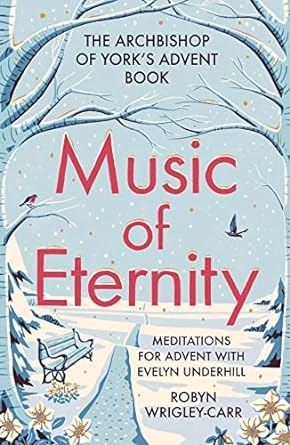Mother Katie reviews “Music of Eternity” by Robyn Wrigley-Carr, the book studied during Advent by the St James Book Club.
This was the chosen book for Advent – which we picked because it focused on the writings of Evelyn Underhill. In our previous book (a novel) Glittering Images by Susan Howatch the priest at the centre of the story was given Evelyn Underhill to read on retreat, after going through a very hard time.
We decided to give it a go ourselves.
There were mixed reviews of the book – some really liked it – but many (most) struggled with the dry and academic way of writing and the confusion caused by the author not using speech marks. This meant it is was often difficult to know what was Evelyn’s words and what wasn’t.
One of the main themes of the book was the need to slow down and become quiet if we are to hear the music of God in our lives and in the world.
Evelyn compares Christians to deaf people at a concert who come and study the programme carefully, speak respectfully of the music and dutifully take their seats, but only catch the slightest vibrations – perhaps a note or two at best. And that in order to hear “the mighty symphony that fills the universe” we have to stop, to make room in our busy lives, and actually listen.
She says we spend most of our lives “conjugating three verbs: to Want; to Have and to Do.” We largely ignore the most important “to Be”. “And that being, not having, not wanting and not doing is the essence of spiritual life.”
However this is not to imply a passive Christian life – the real Christian says Evelyn will always be a revolutionary – as she invites us on a meditation of the words “thy Kingdom come” in the Lord’s prayer.
She encourages us that God must come first in the lives of Christians and yet “many people suggest by their behaviour that God is of far less importance than their bath, morning paper or early cup of tea.” It is not difficult to see the temptations of her time have become so much more in our own. It is a battle to put God first but one she would urge us to fight with courage.
She says our objective in this life is “to attend to God, to Christ, to learn his love and what He wants from you.” That our lives should be “a gentle turning to God” in which we lose our lives in order to be possessed by the much greater life of God.
She warns against any self-importance and uses the story of Christ in the wilderness to explore this, as he is tempted by the Devil.
And she encourages us to bring our shadow self into the light of Christ – to not be afraid of convicting holiness.
Towards the end she comes back to prayer being foundational – and returns to her theme of being before God. Of carving out time for study, silence and prayer (listening to God as much as speaking to him). For her this is the only foundation for true Christian living along with regular taking of the Eucharist, as “some fragments of bread and a chalice of wine are enough to close the gap between two worlds.”
There is no doubt that Evelyn’s view of the Christian life is a demanding one but it is also ultimately a fulfilling one – one in which we get to hear the music of Eternity for ourselves here on earth.
